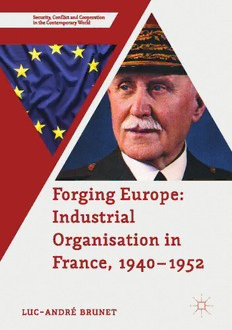
Forging Europe: Industrial Organisation in France, 1940-1952 PDF
Preview Forging Europe: Industrial Organisation in France, 1940-1952
fl Security, Con ict and Cooperation in the Contemporary World Series Editors Effie G. H. Pedaliu LSE Ideas London, United Kingdom John W. Young University of Nottingham Nottingham, United Kingdom ThePalgrave Macmillanseries, Security,ConflictandCooperation inthe ContemporaryWorldaimstomakeasignificantcontributiontoacademic and policy debates on cooperation, conflict and security since 1900. It evolved from the series Global Conflict and Security edited by Professor Saki Ruth Dockrill. The current series welcomes proposals that offer innovativehistoricalperspectives,basedonarchivalevidenceandpromot- ing an empirical understanding of economic and political cooperation, conflict and security, peace-making, diplomacy, humanitarian interven- tion, nation-building, intelligence, terrorism, the influence of ideology andreligiononinternationalrelations,aswellastheworkofinternational organisations andnon-governmental organisations. More information aboutthisseries at http://www.springer.com/series/14489 Luc-AndréBrunet Forging Europe: Industrial Organisation in – France, 1940 1952 Luc-AndréBrunet TheOpenUniversity MiltonKeynes,UnitedKingdom Security,ConflictandCooperationintheContemporaryWorld ISBN978-1-349-95197-0 ISBN978-1-349-95198-7(eBook) DOI10.1057/978-1-349-95198-7 LibraryofCongressControlNumber:2017940278 ©TheEditor(s)(ifapplicable)andTheAuthor(s)2017 Theauthor(s)has/haveassertedtheirright(s)tobeidentifiedastheauthor(s)ofthisworkin accordancewiththeCopyright,DesignsandPatentsAct1988. This work is subject to copyright. All rights are solely and exclusively licensed by the Publisher,whetherthewholeorpartofthematerialisconcerned,specificallytherightsof translation, reprinting, reuse of illustrations, recitation, broadcasting, reproduction on microfilms or in any other physical way, and transmission or information storage and retrieval,electronicadaptation,computersoftware,orbysimilarordissimilarmethodology nowknownorhereafterdeveloped. Theuseofgeneraldescriptivenames,registerednames,trademarks,servicemarks,etc.inthis publicationdoesnotimply,evenintheabsenceofaspecificstatement,thatsuchnamesare exemptfromtherelevantprotectivelawsandregulationsandthereforefreeforgeneraluse. Thepublisher,theauthorsandtheeditorsaresafetoassumethattheadviceandinformation in this book are believed to be true and accurate at the date of publication. Neither the publishernortheauthorsortheeditorsgiveawarranty,expressorimplied,withrespectto thematerialcontainedhereinorforanyerrorsoromissionsthatmayhavebeenmade.The publisherremainsneutralwithregardtojurisdictionalclaimsinpublishedmapsandinstitu- tionalaffiliations. Cover Image: 1st pic Flag: © RubberBall / Alamy Stock Photo 2nd pic / the man (Maréchal Henri Philippe Pétain portrait. Ruler of Vichy France. 24 April 1856-23 July 1951.Uniform.Captionreads)©LebrechtMusicandArtsPhotoLibrary/AlamyStock Photo Printedonacid-freepaper ThisPalgraveMacmillanimprintispublishedbySpringerNature TheregisteredcompanyisMacmillanPublishersLtd. The registered company address is: The Campus, 4 Crinan Street, London, N1 9XW, UnitedKingdom To My parents A CKNOWLEDGEMENTS This book originated as a doctoral dissertation, submitted to the London SchoolofEconomicsin2014.Researchforthisprojecthasbeenfacilitated by the support of a number of funding bodies. The Social Sciences and HumanitiesResearchCouncilofCanadagenerouslyawardedmeaDoctoral Fellowship which provided the resources for me to complete this project. AcademicPartnershipsatLSEalsoprovidedmewithascholarshiptospend severalmonthsatSciencesPo,whichenabledmetocompleteasignificant amountofarchivalresearchinParis.AdditionalgrantsfromtheEconomic History Society, the Association Jean Monnet, the International History Department at LSE, and the Max Weber Programme at EUI supported furtherarchivaltripswhichgreatlyenrichedthisstudy. Firstandforemost,Iwouldliketothankmydoctoralsupervisor,Piers Ludlow. His insightful feedback and steadfast encouragement during my PhDandeversincehavemadethisastrongerworkthanitotherwisecould havebeen.IamalsogratefultoAlanSked,whoverykindlytookmeonas aPhDstudentandactedassupervisorforthefirststagesofmydoctorate.I would also like to thank Julian Jackson and Richard Vinen, my PhD examiners, for providing invaluable advice on revising the thesis for pub- licationandfortheir continuedsupport. I have also benefitted from friends and colleagues who have read and commented on drafts of my chapters. Thanks go to Claire Andrieu, Antony Best, Laura Lee Downs, Annika Mombauer, and Antonio Varsori.FedericoRomeroalsoprovidedpreciousadviceatseveralimpor- tant junctures. A special thank you goes to Eirini Karamouzi for her unflagging support andinvaluablefeedback. vii viii ACKNOWLEDGEMENTS Over the course of this project, I have been lucky to have had rich discussions with Robert Boyce, James Casteel, Mario Del Pero, James Ellison, Kiran Klaus Patel, Arne Westad, and Vladislav Zubok. Conversations with Eric Bussière, Matthew Connelly, Fernando Guirao, TalbotImlay,FrancesLynch,Georges-HenriSoutou,MauriceVaïsseand Laurent Warlouzethavealso been influential. AtLSEIDEAS,whereIheldthePintoPost-doctoralFellowship,Iam grateful to Arne Westad, Mick Cox, Svetozar Rajak, and Nigel Ashton. Thisfellowshipaffordedmeavaluableopportunityimmediatelyfollowing thecompletionofmyPhDtorevisemydissertationforpublicationwhile taking part in the vibrant activities of the centre. I am also thankful to Emilia Knightandthe wholeteam atLSE IDEAS. As a Max Weber Post-doctoral Fellow, the European University Instituteprovidedtheidealsettingtopreparethismanuscriptforpublica- tion. At EUI, thanks go to Emily Baughan, Emmanuel Comte, Guillemette Crouzet, Muriam Haleh Davis, Simon Macdonald, Molly Pucci, andSimonStevens. It has been a privilege to complete this study while teaching at the Open University. I am particularly grateful to Karl Hack and Paul Lawrence for accommodating me in the final months before submitting mymanuscript.AtPalgraveMacmillan,IwouldliketothankEffiePedaliu andJohn Young, theeditors ofthis series,and OliverDyer. Research for this project has taken me to archives in seven countries, andIhavebenefitted greatlyfromthe helpof archivists.Iwouldparticu- larly like to thank Régis Clavé and Philippe Klein at the Fondation Jean Monnet pour l’Europe in Lausanne, Dieter Schlenker at the Historical Archives of the European Union in Florence, Gersande Piernas at the Centre d’Archives du Monde du Travail in Roubaix, Andrea Maier at the Bundesarchiv-Militärarchiv in Freiburg, and Virginie Hébrard at the Institutd’Histoire Socialein Nanterre. Finally,Imustthankfourpeople.First,mywifeRebecca,towhomI’m grateful for so many reasons, not least her boundless encouragement throughout the writing of this book. Second, our daughter Charlotte, who arrived in the final months before I submitted this manuscript. Her decision to begin sleeping through the night from a very young age has undoubtedly meant that this study is more coherent than it might other- wise have been. Finally, I would like to thank my parents for their unwa- vering support and for tirelessly reading drafts of my work. To them this bookis dedicated. C ONTENTS 1 Introduction 1 2 France’s NewIndustrialOrder: Reorganising Industrial ProductionAfterthe Fall ofFrance 19 3 Twixtthe Cupandthe Lip: Buildingthe New Industrial Order,1940–1941 53 4 TheOrganisation CommitteesBetweenCollaboration andResistance,1941–1944 79 5 Nous seronsles successeurs,sinonles héritiers deVichy: Maintaining the NewIndustrialOrder inPost-Vichy France 115 6 Conserver laforme enréformant l’esprit:Reforming Vichy’s IndustrialOrder,1944–1946 147 7 FromOrganisation CommitteestoMonnet’s ModernisationCommissions 177 8 L’Unité de l’Europe està ce prix:The Struggle Between CORSID’s Successorsand the Creationof the ECSC 213 ix x CONTENTS 9 Conclusions 253 Bibliography 267 Index 287
